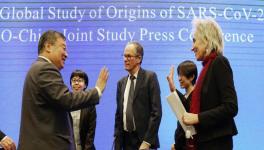Oxford and China’s Candidate Vaccine Trials Show Promising Results: Lancet

Image Courtesy: ABC News
The results of two of candidate vaccines’ phase 1/2 clinical trials published in Lancet have shown encouraging results. One was under the Oxford University, UK and the other is from China. The Oxford vaccine effort was supported by AstraZeneca, while the Chinese trial was supported by Cansino Biologicals of Wuhan, China.
“Both groups used an adenoviral vector, and both report the vaccine achieving humoral responses to the SARS-CoV-2 spike glycoprotein receptor binding domain by day 28 as well as T-cell responses. Both report local and systemic mild adverse events such as fever, fatigue, and injection site pain. In neither trial was a severe adverse event reported,” the Lancet reported .
In the Oxford trial, Andrew Pollard and colleagues reported about their trial of ChAdOx1 nCoV-19 as a randomised one, in which one injection of chimpanzee adenovirus-vectored vaccine was administered. The vaccine was compared with a meningococcal vaccine when administered among 1,077 healthy adults. The subjects given the vaccine were in the age group of 18-55 years having a median of 35 years. They were recruited from five different centres of UK and were followed upto 28 days after injection of the vaccine. The mild adverse effects of the vaccine included fever, headache and fatigue, but could well be simply treated with just paracetamol. Serious adverse effects of any sort were not detected, according to the report. Neutralising antibodies were found to be generated in 90% of the participants and were also found to have sustained to 56 days. Importantly, T cell responses were found in all the participants. Thus, the vaccine candidate has shown both neutralising antibody generation and longer T cell responses. The neutralising antibodies wipe out the virus from the body, in the first place and the T cell response provides a prolonged immunity.
Also read: COVID-19: What is the Worldwide Status of Vaccine Development?
Again, in the Chinese candidate vaccine, Wei Chen and colleagues reported the results of a randomised trial of phase 2. They administered one injection of the adenovirus vectored vaccine candidate in different concentrations, that is 1 × 10¹¹ or 5 × 10¹⁰ viral particles per millilitre. They had 508 healthy adults that were unexposed to COVID19 from one centre in Wuhan. The age group of the participants were 18-83 years having a median of 39.7 years. They also observed mild adverse effects like fever, headache, fatigue, etc. However, no serious adverse effects were observed according to the report. Neutralising antibodies were found to be generated in 85% of the participants, while about 90% developed T cell responses. People above 55 years of age were found to have a lower humoral response, however, T cell responses were not affected by age or sex.
The UK and China results are encouraging and both of them bode well for the next level of clinical trials. Both of the candidate vaccines are currently under phase 3 of clinical trials, meaning that a larger population will be given the vaccines to assess the efficacy and safety of it.
Importantly, the overall results in both the trials are similar in their responses and also in safety, using adenovirus as vectors tried in different geographical locations. Both used adenovirus as vectors to deliver the candidate vaccines. Adenovirus is a group of virus that causes common cold, cough, diarrhoea and eye infection and is a potential vaccine platform.
Get the latest reports & analysis with people's perspective on Protests, movements & deep analytical videos, discussions of the current affairs in your Telegram app. Subscribe to NewsClick's Telegram channel & get Real-Time updates on stories, as they get published on our website.
























